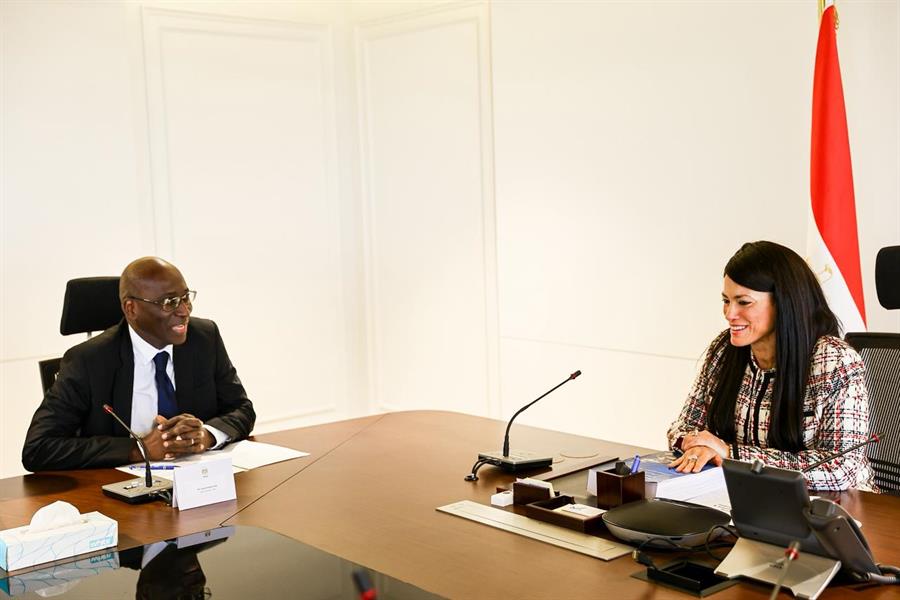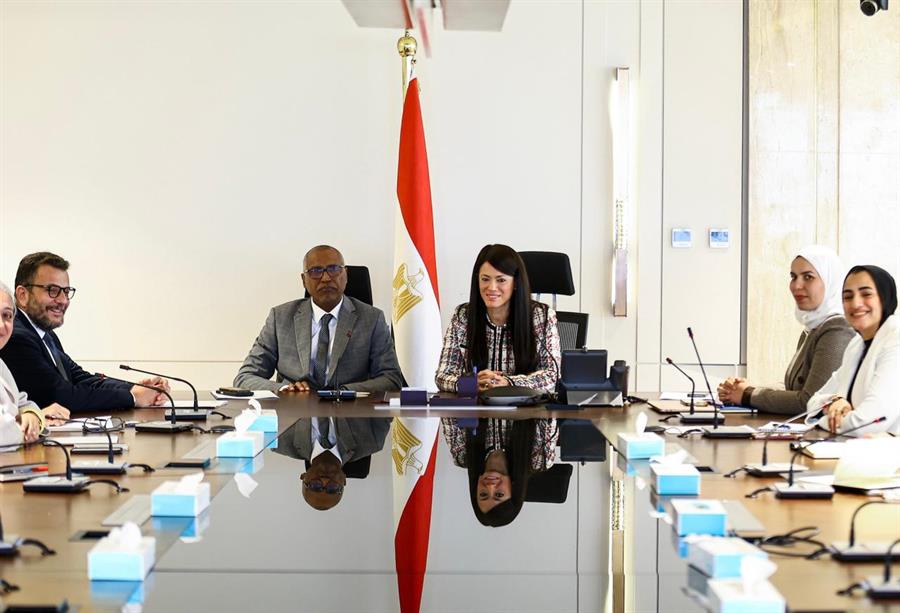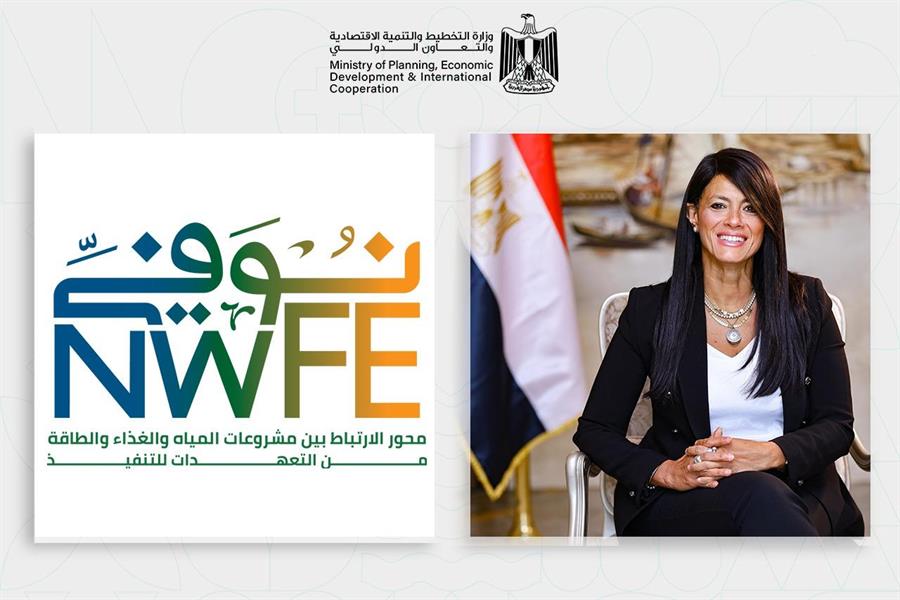The Ministry of Planning and Economic Development holds a workshop on "Localizing SDGs in the Egyptian Governorates" in cooperation with UNDP.

10 January 2023
The Ministry of Planning and Economic Development, in cooperation with the United Nations Development Program (UNDP), held a high-level workshop entitled "Localizing the Sustainable Development Goals at the Egyptian Governorates Level: Preparing Voluntary Local Reports."
The workshop witnessed the presence of H.E. Dr. Hala El-Said, Minister of Planning and Economic Development, Major General Hisham Amna, Minister of Local Development, Alessandro Fracasti, Resident Representative of the United Nations Development Program in Egypt, Major General Khairat Barakat, Head of the Central Agency for Public Mobilization and Statistics (CAPMS), Dr. Ahmed Kamali, Deputy Minister of Planning, Dr. Mona Essam, Assistant Minister for Sustainable Development Affairs.
During her speech, Dr. Hala El-Said, Minister of Planning and Economic Development, said that the importance of the workshop lies in the opportunity it provides for dialogue, the exchange of experiences, and the review of best practices, lessons learned, and challenges, to accelerate the pace of implementation of the sustainable development goals, especially at the local level.
El-Said added that the whole world is currently witnessing an unprecedented crisis as a result of the outbreak of the Covid 19 pandemic and the subsequent outbreak of the Russian-Ukrainian war, whose negative repercussions affected the efforts of various countries and their path to achieve the goals of sustainable development as per the 2030 Agenda.
El-Said added that countries are in dire need more than ever before to rearrange priorities and ensure the active participation of local administrations in the development planning process, while following up the implementation of sustainable development goals and identifying development gaps, according to a “bottom-up” approach that helps advance development paths.
El-Said stressed that the Egyptian state pays increasing attention to the process of localizing the sustainable development goals, because of its supportive impact on achieving inclusive and sustainable growth and balanced regional development, as they are among the main pillars of Egypt's Vision 2030.
El-Said added that the Egyptian state continues its efforts, in cooperation with all development partners, to develop and implement evidence-based policies to achieve the goals of sustainable development at the local level.
El-Said explained that the goals of sustainable development are inseparable from the goals of the state, explaining that the country is working on major goals, including achieving sustainable economic growth and providing decent job opportunities, following up that these goals are consistent with the 17 SDGs.
El-Said explained that the Ministry of Planning and Economic Development, in cooperation with the Information and Decision Support Center in the Cabinet, the Egyptian National Council for Competitiveness, and the CAPMS, embarked on an ambitious project to develop the first indicator of the competitiveness of the Egyptian governorates.
El-Said discussed the general planning law, which reinforces the principle of decentralization, explaining that the application of decentralization is accompanied by two main challenges, which are the challenge of the institutional and human environment, noting the importance of the training component when applying decentralization.
El-Said added that this is achieved by following up the implementation of the sustainable development goals and Egypt's Vision 2030 at the governorate level, identifying and addressing development gaps between the different governorates, as well as motivating the governorates to improve their competitive performance by creating a positive environment to enhance competitive capabilities.
Dr. Hala El-Said indicated that the Egyptian government, represented by the Ministry of Planning and Economic Development, for the first time, in cooperation and distinguished partnership with the United Nations Population Fund, launched twenty-seven reports to localize the sustainable development goals at the local level for each governorate for the year 2020.
El-Said also referred to the launch of the national initiative for smart green projects in all Egyptian governorates last August under the decision of the Prime Minister, under the auspices of the President of the Republic, and in cooperation with the Ministry of Local Development, representing a pioneering Egyptian development initiative aimed at stimulating creative ideas and practical implementation of innovative environmental solutions. In all governorates of Egypt.
El-Said added that all of this comes as an affirmation of the Egyptian state's ability to balance efforts to achieve development at the national level and to actively participate in all development initiatives, at the regional and international levels, based on Egypt's constant keenness to cooperate with all parties of the international community regarding development issues and challenges.
El-Said indicated that Egypt is always keen to exchange expertise with various countries of the world in this field, as Egypt regularly participates in the high-level political forum for sustainable development, and it is among only 10 countries in the world that have submitted three voluntary reports that monitor the progress made to achieve the SDGs.
During her speech, El-Said referred to the national project for the development of the Egyptian countryside: a decent life initiative, in which the efforts of all state agencies and institutions are combined to implement in partnership with the private sector and civil society, which aims to change the face of life for the better for more than half of Egypt's population in villages and rural areas.
El-Said touched on the launch of the Egyptian government, represented by the Ministry of Planning and Economic Development, "A decent life initiative for an Africa that can withstand climate change", during the CoP27 under the supervision of the presidential initiative, in the presence of heads and representatives of a large number of brotherly African countries.
El-Said talked about the national project for the development of the Egyptian family, which was launched under the auspices of the President of the Republic, as an integrated development project that aims to control population growth rates while improving the characteristics of the population.
El-Said stressed that it is impossible to achieve progress in the sustainable development goals without controlling population growth rates and achieving a balance between population growth rates and natural resources at the national and governorate levels.









